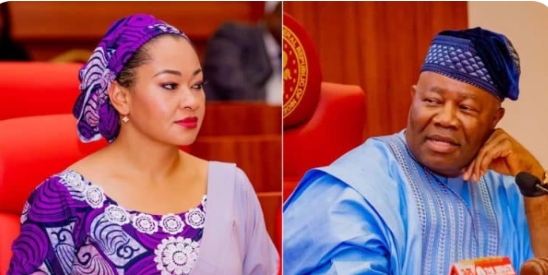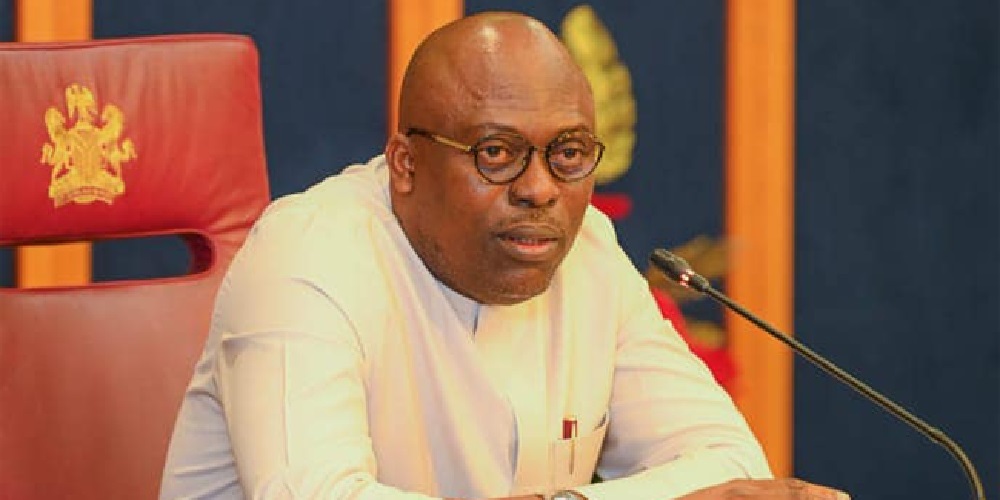News
Reps back ban on under-18 SSCE, UTME candidates

The recent decision by the Federal Government to peg the minimum age for candidates sitting for the Senior Secondary School Certificate Examination may have come to stay, the House of Representatives Committee on Basic Education has said.
The Minister of Education, Prof Tahir Mamman, had in July stated that with effect from 2025, any candidate below the age of 18 will not be allowed to sit the SSSCE and without which such students cannot secure admission to higher institutions of learning.
The announcement has generated heated debate among parents and education stakeholders.
In an exclusive interview with The PUNCH on Thursday, the Chairman of the House of Representatives Committee on Basic Education, Mark Useni, gave reasons the Federal Government might not likely reverse the decision.
He said, “The Committees on Basic Education and Examination Boards took this matter to the leadership of the House of Representatives. The Speaker, Tajudeen Abbas, promptly appointed the House Leader, Prof Julius Ihonvere, to moderate a meeting between the two committees and the Minister of Education, Prof Tahir Mamman.
“The meeting was held on Wednesday, September 4, and the minister attended together with the Minister of State for Education, Dr Tanko Sununu, as well as the heads of basic education examination bodies.
“The minister explained that the policy that relates to the 18 years age requirement for entry into the university is a policy that was developed before the adoption of the 6-3-3-4 system. He explained that the policy also has a root in the Universal Basic Education Act.
“Prof Tahir said the policy is not peculiar to Nigeria, while also making reference to military and paramilitary institutions which place the entry age at 18 years. He also said that the voting age in Nigeria is pegged at 18 years.”
Useni, a member of the All Progressives Congress representing Takum/Donga/Ussa Federal Constituency, Taraba State, frowned on the situation where children not older than 12 “are being made to seek admission into universities.”
“While the policy is meant to ensure that children pursue their education alongside their cognitive and physical development and maturity, the Ministry of Education should develop a framework for proper transition into a full policy implementation.
“The Ministry of Education must ensure that students who are already progressing in the senior classes in secondary schools are not left stranded after completion of that level of education.
“We mandated the minister and his team to work out ways of handling the policy based on data available to the ministry and ensure that the policy does not jeopardise public interest,” he added.
News
2027: Ex-Gov El-Rufai visits Aregbesola, Tunde Bakare in Lagos

By Kayode Sanni-Arewa
Ex- Kaduna State Governor, Nasir El-Rufai, paid a visit to former Minister of Interior, Rauf Aregbesola, and cleric Pastor Tunde Bakare in Lagos.
The visit was disclosed by Muyiwa Adekeye, El-Rufai’s media adviser, in a tweet on Sunday.
“Malam Nasir @elrufai was in Lagos today to visit Ogbeni @raufaregbesola and Pastor Tunde Bakare,” Adekeye wrote.
El-Rufai’s meeting with both men is coming days after visiting former President Muhammadu Buhari in Kaduna.
The former Kaduna governor’s visit to Lagos has fueled fresh conversations about his political future and possible strategic alliances ahead of the 2027 elections.
Aregbesola, a former two-term governor of Osun State and a former ally of President Bola Tinubu recently left the All Progressives Congress after a protracted crisis within the party in Osun State.
Bakare, on the other hand, is a known political voice and a former presidential aspirant under the APC.
News
Saraki to Akpabio: Do not trivialize call for due process in Senate

By Kayode Sanni-Arewa
Ex-Senate President, Dr. Abubakar Bukola Saraki, has described as “cheap politics and trivialising of a serious issue” the claim by incumbent Senate President, Godswill Akpabio, that the call on him to ensure that transparent and open process is instituted to investigate the accusation levelled against him by Senator Natasha Akpoti-Uduaghan is an attempt to remove a Niger Delta person from office.
In a statement, the Head of the Abubakar Bukola Saraki Media Office, Yusuph Olaniyonu, said, “Dr. Saraki never called on the Senate President to resign or step aside.
Rather, he urged the Senate President to be conscious of the fact that perception is reality and therefore he should avoid treating the allegations by the Senator in a manner that will create the perception that the Senate as an institution is trying to cover up issues bothering on sexual harassment, gender discrimination, and abuse of office.”
The Head of the Abubakar Bukola Saraki Media Office emphasized that Dr. Saraki’s intervention was neither about Senator Akpoti-Uduaghan nor whether her claim was right or not.
“He stated that since the Senator has gone public with such serious allegations against the presiding officer, the image of the institution should be saved through an honest, sincere, open, transparent, and unbiased investigation,” Olaniyonu said.
Dr. Saraki also pointed out that there are already existing processes recommended in the Constitution, laws of the land, Senate rules, conventions, and precedents to be followed in carrying out such investigation. “Dr. Saraki is of the firm belief that his suggestions are for the benefit of the legislative institution,” Olaniyonu said.
The Head of the Abubakar Bukola Saraki Media Office noted that Dr. Saraki’s comment was not about Akpabio’s region or party affiliation. “It is disingenuous and crude to describe Dr. Saraki’s comment along those primordial lines,” he said.
Dr. Saraki emphasized that the issue is not one in which Akpabio should exploit ethnic sentiments, political division, or regional proclivity. “This will neither be in his own interest or that of the institution over which he is presiding. He should face the reality on ground and do what is right,” Olaniyonu quoted Dr. Saraki as saying.
News
Natasha: “You Can’t Be Master In Judgment Over Your Case-Ex-First Lady Bombs Akpabio

By Kayode Sanni-Arewa
Ex-Ekiti First Lady and activist, Erelu Bisi Fayemi has slammed the outcry against Senator Natasha Akpoti-Uduaghan over her claim of sexual harassment levelled against the President of the Senate, Senator Godswill Akpabio.
In a statement marking the International Women’s Day, Mrs Fayemi said that Akpabio should not have sat in judgment over the case levelled against him
“Over the past two weeks, we have witnessed a number of events at the Nigerian Senate, which have left some of us shell-shocked.
” It is quite common for arguments and battles of all kinds to break out in the National Assembly. It is not easy for so many representatives of their people to get along without ruffling each other’s feathers. However, what we have all witnessed recently cannot be considered normal. Senator Natasha Akpoti-Uduaghan, representing Kogi Central Senatorial District, wanted to speak from the floor of the Senate.
“She was not recognised to speak because her seat had been moved. She refused to proceed to her new seat because she felt undermined and disrespected.
Apparently, Senator Natasha had been bottling in a number of grievances against her colleagues, especially the Senate President, Senator Godswill Akpabio. She then went on to make allegations of sexual harassment against the Senate President on national television.
After she dropped the bomb, there was a flurry of activities.
” Senator Ireti Kingibe, a serving female Senator and two former female Senators – Senator Abiodun Olujimi and Senator Florence ita-Giwa, were invited to share their views. All three Senators are older friends or at least acquaintances of mine, and I have a lot of respect for them.
“However, I found their submissions extremely disappointing. It is one thing to argue that it is important to follow the rules. I don’t think anyone will insist on flouting the rules of such an important institution, especially if they are applied fairly and not subjectively.
“It was however clear that Senator Natasha felt beleaguered, and she believed that there was a score the Senate President
wanted to settle with her.
” If this was the case, then I would have expected the three Senators to support a process that would enable Senator Natasha shed light on her serious allegations of sexual harassment (beyond national television) and for the Senate President to defend himself in a transparent manner. To my horror, none of the female Senators deemed it necessary to stand up for another woman.
“Even if, in their opinion, Senator Natasha was misguided on matters of process and temperament, she was still entitled to have her fears and concerns heard. It is so painful that all three of them missed an opportunity to see the bigger picture, and address the constant intimidation, gaslighting and belittling women in leadership positions go through.
“I was shocked to hear Senator Florence Ita-Giwa claim that ‘if you are a Senator as a woman, no one can harass you’. On July 12th, 2016, Senator Dino Melaye threatened to assault and impregnate his female colleague, Senator Oluremi Tinubu on the floor of the Senate, and ‘nothing will happen’.
” That unbelievable insult was not only directed at Senator Oluremi Tinubu, who is now the First Lady of the country, but to all Nigerian women who venture into public life in various capacities.
“Before our very eyes, in this country we live in, several senior female politicians have been insulted and disrespected by other male politicians at one point or the other.
“Most women in leadership positions have to contend with patriarchal odds overwhelmingly stacked against them, so they learn survival skills to help them conserve their energy and live to fight another day. It is an understandable strategy, but not always a wise one when you have an opportunity to close ranks and make a point that will go a long way in demanding a new culture of respect for women in leadership.
“To all the women who have publicly taken a position against Senator Natasha, I have news for you.
” You are not fighting the same battle as most of the male Senators or the men around us who have also aired their views. You are not on the same page, you are not even reading the same book. If it was just about Senator Natasha following the rules and not disrupting the space for women in politics, the problem can be easily fixed. I am sure if Senator Natasha takes the time to familiarise herself with Senate rules and proceedings (assuming she has not done so already) this will make her work in the Senate more productive.
However, this is not what is at play here. What is happening is a full-scale war on women in public life, with clear lines drawn. Women need to wake up! We need to do battle with the powerful forces that want women to keep being silent in the face of provocation and abuse, those who have a penchant for using women against women and those who dangle carrots and sticks while we dance and perform for them. We don’t have to like Senator Natasha Akpoti-Uduaghan. She does not need to be liked or admired. Yet, she needs to be respected, heard, and allowed justice. The misogyny in high places this case has revealed is unsettling. One of Senator Natasha’s colleagues, Senator Peter Nwebonyi, Deputy Chief Whip, had the audacity to go on television to allege that Senator Natasha has X number of children for X number of men (a claim that is untrue) therefore her allegations of sexual harassment should be disregarded. Really? Coming from a place where many of the leaders there have households straight out of the popular family comedy ‘Fuji House of Commotion’.
My heart broke when one of the female ‘protesters for hire’ said she was protesting because they do not want ‘stubborn women’ like Senator Natasha. Her words might have sounded like the rants of an illiterate, but those are the sentiments of the powerful people who surround Senator Natasha. She is too opinionated, stubborn, uncontrollable, all the things no woman is meant to be. They want women who are quiet, humble, play by the rules (as set by them) and who literally and figuratively, keep their heads down. Since we only have 4 women out of 109 Senators, it is no surprise that the ‘Landlords’ will always make sure the ‘Tenants’ know their place. The moment you forget, you will be forcefully reminded. If you are in doubt, seek out the footage of proceedings at the Lagos State House of Assembly on March 3rd.
What happened in the Senate chambers on March 6th 2025 was a travesty. The impunity and disregard were breathtaking. The Senate President should have demonstrated leadership by allowing someone else to receive the petition against him. You cannot sit in judgement over a case that involves you. As if that was not bad enough, there was a rush to suspend Senator Natasha for six months, minus her privileges, even when there are court rulings that suspending legislators for more than 14 days is detrimental to their representational functions. This was clearly designed to humiliate, punish and demean Senator Natasha as much as possible.
Time and history will be the judge of all concerned. In my own opinion, this is not about Senator Natasha. This is about all the women who venture into leadership positions, who have to contend with hostile working environments, who have to live through their private lives being picked apart, and who have to struggle to balance all their professional and personal obligations. To those who have been asking the foolish question, is she the only one? why don’t you start by asking all the women in your life what they have gone through to get where they are.
As we mark (I can’t find it in me to celebrate) another International Women’s Day on March 8th, it would serve us well as Nigerian women to know which battles we want to fight and what wars are worth winning. We all need to stand and fight for ourselves, the war is not against one woman.
-

 News6 hours ago
News6 hours agoRivers crisis: Fubara finally bows, invites authentic lawmakers to meeting, offers to pay all outstanding allowances
-

 News5 hours ago
News5 hours agoJapa Bad side: “ How I Lost My Husband the Day We Arrived In Canada”
-

 News12 hours ago
News12 hours agoPastor Adeboye narrates how he collapsed in Ilesha
-

 News5 hours ago
News5 hours agoBREAKING: Miyetti Allah leader shot dead by unidentified gunmen
-

 News19 hours ago
News19 hours agoJust in: Dickson, opposition lawmakers throw weight behind suspended Senator Natasha
-

 News6 hours ago
News6 hours agoRivers Ijaw group cautions INC over calls to perpetuate violence
-

 Economy17 hours ago
Economy17 hours agoFG grants licenses for 3 new petroleum refineries
-

 Economy17 hours ago
Economy17 hours agoNigeria’s international trade hit N36.6tn in Q4 2024 – NBS






